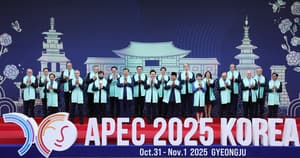
While uniting 21 economies on trade and AI innovation, Seoul sets stage for US-China trade truce -- and its own US tariff deal
The 2025 Asia-Pacific Economic Cooperation summit closed Saturday in the historic southeastern city of Gyeongju, marking a defining moment for South Korea’s global leadership two decades after it last chaired the forum in Busan.
With the adoption of the landmark “Gyeongju Declaration” and unprecedented agreements on artificial intelligence, trade and regional cooperation, the summit highlighted Seoul’s growing diplomatic stature as a bridge among major powers navigating an increasingly fragmented global order.
South Korean President Lee Jae Myung, chairing the summit, successfully led 21 member economies to a consensus on the declaration, which reaffirmed the group’s shared vision of connectivity, innovation and prosperity.
The declaration encapsulated a range of priorities — from trade and digital innovation to inclusive and sustainable growth — while introducing AI and demographic change as key cross-cutting themes for the next decade.
In a historic first, the declaration also recognized cultural and creative industries as a new growth engine for the Asia-Pacific region, formalizing their inclusion in APEC’s long-term cooperation agenda.
“The Gyeongju Declaration, the AI Initiative, and the Joint Framework on Demographic Change reflect our united determination to build a region of peace and prosperity,” Lee said in a press conference held at the Gyeongju Hwabaek International Convention Center on Saturday.
“This is a collective achievement made possible by the solidarity of APEC’s economic leaders.”
On the sidelines of the summit, Lee’s bilateral diplomacy yielded concrete outcomes.

His second summit with US President Donald Trump produced a breakthrough in long-stalled tariff negotiations, maintaining Korea’s commitment to investing $350 billion in the US while securing key safeguards on investment caps, cash ratios and repatriation rights — a deal hailed in Seoul as a pragmatic success.
The two leaders also reached a breakthrough on Korea’s long-sought plan to procure nuclear-powered submarines, an issue that had remained off-limits for decades under the terms of the US–Korea alliance.
During the talks, Trump gave formal approval to the nuclear submarines in principle, signaling Washington’s readiness to cooperate on the project — a move widely seen as a symbolic green light for Seoul to begin technical and strategic preparations.
Defense experts say the approval marks a major shift in US policy, reflecting growing trust in Korea’s defense capabilities and its role in regional deterrence.
Choi Il, a retired South Korean Navy captain and head of the Submarine Research Institute, described the decision as “a historic turning point in alliance cooperation,” adding that it elevates bilateral ties from technological dependence to a true strategic partnership.
Meanwhile, Lee’s meeting Friday with Nvidia CEO Jensen Huang and the heads of major Korean conglomerates — Samsung Electronics, SK Group, Hyundai Motor Group and Naver — anchored Seoul’s ambition to become one of the world’s top three AI powers.
Nvidia pledged to supply 260,000 graphics processing units to Korean firms and expand procurement of high-bandwidth memory chips from Samsung and SK hynix — a deal expected to accelerate the nation’s AI infrastructure buildup.
The inclusion of an “APEC AI Initiative” in the declaration — the first AI agreement jointly endorsed by both the US and China — underscored Seoul’s deft balancing of technology diplomacy.

Lee also held his first summit with Japanese Prime Minister Sanae Takaichi, reaffirming the two nations’ commitment to forward-looking relations and continued diplomacy through reciprocal visits. While historical disputes were left off the agenda, both leaders agreed to expand cooperation in economic and security areas.
His 95-minute meeting with Chinese President Xi Jinping, who was visiting the country for the first time in 11 years, produced seven memorandums of understanding on economic cooperation, service trade and high-level communication channels.
Although Seoul did not secure an explicit end to China’s unofficial restrictions on Korean cultural exports, the meeting was widely seen as a step toward stabilizing relations amid geopolitical tension.
For several days, Gyeongju — the ancient capital of the Silla Kingdom — transformed into a hub of 21st-century diplomacy. More than 1,700 global business leaders gathered for the APEC CEO Summit and a series of sectoral forums, unlocking new opportunities for Korean enterprises.

According to a joint study by the Korea Chamber of Commerce and Industry and consulting firm Deloitte, the event is expected to generate 7.4 trillion won ($5.3 billion) in total economic impact, including 3.3 trillion won in immediate boosts to tourism and domestic demand, and 4.1 trillion won in mid- to long-term gains.
The summit provided rare space for US-China engagement, with the Trump-Xi meeting signaling a pause in the ongoing trade war. Analysts say Seoul’s steady mediation reflected its growing diplomatic maturity.
“While the rivalry between the US and China will persist, both sides appear to have agreed to contain escalation,” Korea Investment & Securities wrote in a recent report, calling the outcome “a separation agreement rather than a truce.”
As South Korea navigates this delicate triangle among Washington, Beijing and Tokyo, President Lee’s “pragmatic diplomacy” — seeking cooperation with China within the trilateral US-South Korea-Japan framework — will remain a key test of his administration’s foreign policy.
With the Gyeongju Declaration adopted and a roadmap for AI cooperation set in motion, South Korea leaves this year’s APEC Summit with renewed confidence — not merely as a host, but as a connector in a divided world, observers say.
mkjung@heraldcorp.com

